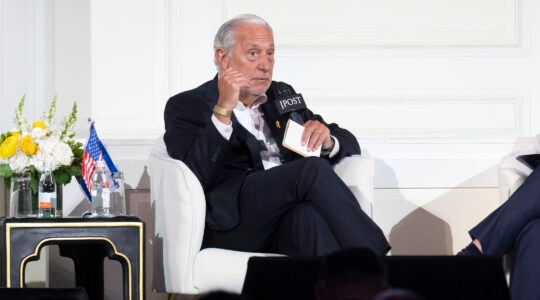NEW YORK (JTA) — Several Jewish non-profit groups are lauding passage of health care reform legislation, saying it will benefit the community on a number of levels. Other groups, however, are keeping quiet in what some observers and insiders describe as an attempt to keep out of the political crossfire.
On Monday, the morning after the U.S. House of Representatives voted along party lines to pass a measure that would create sweeping change in the country’s health care and insurance system, a slew of Jewish groups issued statements supporting the bill and looking forward to President Obama signing it into law.
B’nai B’rith International has been closely watching the bill’s evolution over the past year because it operates a network of senior residences, according to Rachel Goldberg, B’nai B’rith’s director of aging policy.
“We have looked at the whole thing because we think access to health care for younger people is going to affect how they age,” Goldberg said. “All of the Jewish organizations have come at this from slightly different angles. Because of our expertise, we are looking at things like access to care for everyone. And healthy aging is not possible without access to healthcare.”
Likewise, the Religious Action Center, the political lobby of the Reform movement, said in a statement that the adopted bill "is not perfect. But it is necessary."
And while the Jewish Council on Public Affairs did not put out a public statement, its executive director, Rabbi Steve Gutow, endorsed the bill in an interview with JTA Tuesday.
“Knowing our community, we will take advantage of the things in there that apply for us,” said Gutow, whose organization is a public policy umbrella group bringing together the synagogue movements, several national organizations and more than 100 communities in North America.
Among those declining to comment on the passage of the bill is the Jewish Federations of North America, the North American arm of the country’s largest Jewish charitable network.
According to sources familiar with the situation, some Democrats were upset that Jewish Federations did not play an active role in the push for passage of the final bill.
The decision to sit the fight out came despite the fact that the JFNA and its Washington office played a lead behind-the-scenes role in advocating for parts of the bill, which Congress approved 219-212 late Sunday night. In particular, JFNA pushed for inclusion of two parts of the bill it thinks could create “transformational” change for the Jewish community: The Early Act, which will create more funding for breast cancer research and detection, and The Class Act, which will allow workers to buy into a system — much like they buy into Medicare — that will provide up to $3,000 per month for long-term support and services for the elderly and infirm.
Jewish Federations also played a lead role in getting a measure killed that would have helped pay for the bill by reducing the tax deductibility of charitable contributions of top wage earners.
The long-term funding could also prove a windfall for the 120 Jewish nursing homes, 145 Jewish family service agencies and 15-20 Jewish hospitals that the federation system supports.
Yet, in the end, Jewish Federations did not attempt to rally support for the overall bill. When asked about the decision to sit out the final stages of the legislative fight, a spokesman for Jewish Federations wrote: “We will not be issuing any statements on this issue.”
Officials at several Jewish organizations backing the legislation said that as the highly charged, bitterly partisan fight heated up in Washington, it spilled into the board rooms of many Jewish organizations, making it harder for some to take a public stand on the bill — even if they wanted it to pass.
A federation insider confirmed that a similar dynamic was at work the JFNA. The insider said that the organization’s “hands are being tied” by executives at local federations who worry “that GOP donors will be livid if JFNA gets publicly engaged.”
Steve Hoffman, the CEO of the Jewish Federation of Cleveland and the former CEO of the JFNA’s predecessor, the United Jewish Communities, defended the decision not to pick sides in the fight over the bill. And insisted the federations — which collectively raise close to $2 billion per year and through JFNA lobby the federal government for hundreds of millions more to help care for the elderly — never planned to take a position on the overall legislation.
“We weren’t under any pressure one way or the other. In other words, we did not plan to take a position on health care reform, because it was so hotly debated. And while some people may characterize it as a social justice issue and therefore would expect a Jewish perspective, others would say that it is an economic or budgetary type issue,” Hoffman said. “It is a political issue as much as anything else, and therefore it falls outside the providence of federations.”
It’s one thing to “make sure some things are included” in a bill, he said. “But that is different than saying that you need to take a stand on the whole thing.”
“You have this all the time, and you have to decide that something is Jewish enough or momentous enough to have the federation itself be on the line. It is rare, because there are plenty of other ways for people to act out their political philosophies. Federation is not that place,” Hoffman said.
Jewish partisan organizations have played true to form on the issue. On Monday, the National Jewish Democratic Council effusively praised the bill and the president for getting it passed, saying it ranked among “such monumental legislative achievements as the passage of Social Security in the 1930s.”
Shortly before the bill was passed into law, the Republican Jewish Coalition called the proposal “deeply flawed” and said, “Substantively, the Obama plan is wrong for America."
With partisan feelings running high, federations need to avoid being dragged into the fray, Hoffman said.
“When you go to war politically, everybody wants you there without regard to the damage done to you,” Hoffman said. “It is real partisan warfare, and we have the job of holding things together.”
The Reform movement’s top official in Washington, the RAC’s executive director, Rabbi David Saperstein, said it was “amazing how few Jewish groups got into this fight.”
The JCPA says it supported the bill and was publicly applauding its passage publicly, though it did not issue a news release. Health care is a loaded issue, especially for an umbrella group that has many factions to please.
“We supported this,” the JCPA’s Gutow said. “But it became more complicated as the health care bill became more complicated and partisan.”
JTA has documented Jewish history in real-time for over a century. Keep our journalism strong by joining us in supporting independent, award-winning reporting.





